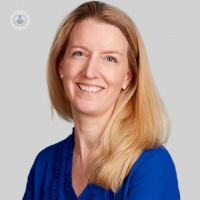IVF and egg freezing: Your questions answered
Written by:What is IVF and when is it recommended?
In vitro fertilisation (IVF) is the process of combining eggs and sperm in the laboratory to create embryos. These embryos can then be transferred into the womb to try and achieve a successful pregnancy. IVF can be recommended for a number of reasons such as:
- Fallopian tube problems.
- Male factor infertility.
- Severe endometriosis.
- Unexplained infertility where other treatments have failed.
Is there an age limit to IVF?
There is no legal age limit for IVF in the UK, however success rates when using your own eggs decrease with age, primarily due to declining egg quality. It is very uncommon to have successful treatment beyond the age of 45 unless using donor eggs. Your specialist should do an assessment of your individual circumstances and advise you on the various treatment options and expected success rates.

How does IVF work? How are eggs retrieved?
During the IVF process fertility experts give medications to stimulate the ovaries in order to produce multiple follicles, which should contain an egg.
Once the follicles reach a certain size, a procedure is performed to collect the eggs. This procedure is usually carried out through the vagina, where a small needle is inserted though the vaginal wall into each ovary. It is performed under sedation or anaesthetic.
Once the eggs have been collected, they are combined with the sperm in the laboratory, and by the next morning you are able to find out how many eggs have fertilised and therefore how many embryos have formed.
The embryos are then grown in the laboratory for up to 5 or 6 days before the embryo transfer procedure takes place.
Are there any risks, to the embryo or to me, during IVF?
There are certain risks with IVF. Usually, fertility doctors aim to collect around 8 to 15 eggs. If they collect more than that, there is a risk to the patient of Ovarian Hyperstimulation Syndrome (OHSS), a condition which can cause fluid to accumulate in the abdomen and lungs and increase risk of blood clots. There are ways to reduce risk of OHSS during your treatment.
Pregnancy after IVF still has a risk of miscarriage or pregnancy. Additionally, multiple pregnancies such as twins or triplets are at higher risk of pregnancy complications such as preterm labour or pre-eclampsia. For this reason, doctors are increasingly transferring one embryo at a time to reduce the risk of multiple pregnancy.
What is the success rate of IVF? What can I do to improve these outcomes?
The success rates of IVF depend mainly on female age. They vary from birth rates of 32% in under 35’s to less than 5% in patients 43 years or over. The individual clinics success rates can be found on the HFEA website. Environmental factors can affect egg and sperm quality therefore there are various recommendations for people going through IVF.
Recommendations include:
- Adopting a healthy, balanced diet, rich in antioxidants.
- Avoiding smoking and drug use.
- Minimising alcohol and maintaining a healthy weight.
- Supplementation of folic acid and vitamin D.
What options are available if a woman’s eggs are not viable?
If you have very low ovarian reserve or low egg quality, you may be recommended to consider using donor eggs. These are usually donated by people under the age of 35 and so have chances of success of around 50% per cycle.
Egg freezing

When is the best time to consider egg freezing?
Success rates from frozen eggs are closely related to age and so the ideal time to freeze eggs is before the age of 35 because egg quality starts to decline after this point.
How many eggs should women aim to freeze in each cycle?
For women with normal ovarian reserve, doctors expect to collect 8-15 eggs per cycle. If you freeze your eggs before the age of 35, freezing 20 eggs gives you at least an 80% chance of having a child using those eggs. Some people will therefore need to do more than one cycle.
How are eggs retrieved and frozen? How safe is the procedure?
Injectable medications are used to stimulate the ovaries to produce multiple eggs. When mature, an egg collection procedure is carried out and is usually done vaginally under sedation/anaesthetic. The eggs are then prepared in the lab and frozen. Nowadays, clinics use the fast freezing technique called vitrification which has higher survival rates compared to older techniques.
Do women need to stop their birth control for the procedure?
In most cases you will stop your birth control when fertility experts begin the injections for your cycle. For people with an intrauterine device, this can remain in place during egg freezing.
For how long can the frozen eggs be stored for use in treatment?
Following recent changes in the law you can now legally store your eggs for up to 55 years, however your consent needs to be renewed every 10 years.


